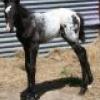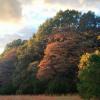Question about Agouti
Forums
Re: Question about Agouti
when talking about a specific aspect, I tend to say "homozygous/heterozygous for /insert gene/". For example, Wap Spotted is homozygous for black/extension, heterozygous for agouti. Our Pepper is homozygous for agouti, heterozygous for extension (thus we'll never have anything but bay from that pairing! LOL). This style seems to work for all genes. :rofl
Diane
Re: Question about Agouti
[quote="admin"]Ok So,
homozygous agouti (brown/brown)
homozygous agouti (bay/bay)
and for AAt
homozygous agouti (bay/brown)[/quote]
That's correct.
And no, there really is no negative for anything, only recessive. But that's semantics. Agouti 'aa' is "homozygous recessive". That still doesn't cover it correctly since it's a multiple allelic series.
Re: Question about Agouti
[quote="horsegen"]"Homozygous for the brown allele at agouti." (At/At)
"Homozygous for the wild-type agouti." (A/A)
"Homozygous for the recessive allele at agouti." (a/a)[/quote]
And AAt?
Heterozygous for the wild-type agouti and heterozygous for the brown allele at agouti (A/At)?
Re: Question about Agouti
[quote="Monsterpony"]Well, chestnuts are just as homozygous at extension as a black can be. Chestnuts are homozygous recessive at extension.[/quote]
I could have sworn I typed a response to this....
That's why I use the word "for"...indicates that the horse is homozygous for that trait. I feel using "at" doesn't separate out a specific trait, whereas "for" does.
Diane
Re: Question about Agouti
In small animal genetics the word 'carried' is only used for a recessive gene that only has one copy and is not expressed and the word 'self' is used for non-agouti, aa, so you would say 'bay carrying self; brown carrying self, bay carrying brown.
It gets confusing, for me anyway, to call a self black horse black as genetically a bay is black too. The way my mind sees it, self is aa, black is E-.






Re: Question about Agouti
As far as I'm concerned it's a genotype as much as "bay" is a genotype. I'd personally say "homozygous brown". That might cause some people to think the horse was also 'EE' though. You could say "homozygous agouti (seal/brown)".